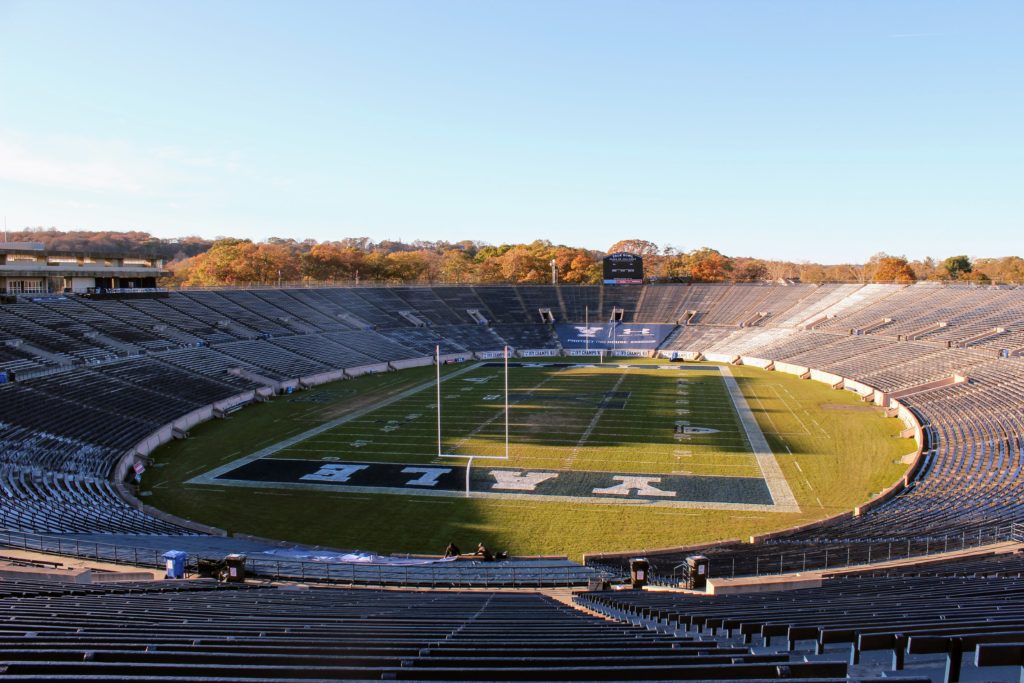FOOTBALL: Redesigning Yale football during a pandemic
While the Yale football team won’t be preparing to take on Lehigh this upcoming weekend, the Bulldogs can look forward to safe, productive practice sessions that will hopefully pay dividends whenever sports are able to make a return.

Lukas Flippo, Photo Editor
On Wednesday, July 8, as COVID-19 cases continued to rise in many parts of the United States, the Ivy League decided to cancel all sports through the end of the calendar year — marking the termination of the competitive football season for Yale’s team, the defending Ivy League champion.
With the health and safety of a global student body as its paramount priority, the Ivy League — adhering to the advice of public health experts — instituted campus-wide policies consisting of social distancing requirements, restrictions on student travel and limitations on group gatherings. For League officials, it was then a question of whether — or to what extent — these campus policies would apply to athletes. Ultimately, officials decided that collegiate athletics needed to function in strict accordance with campus policies, making it impossible for any Ancient Eight team to participate in intercollegiate competition before the end of the fall semester.
The League’s decision, however, does not rule out the possibility of teams holding training sessions — as long as these practices are carried out in line with each school’s procedures and respective state stratagems. While the Yale football team won’t be preparing to take on Lehigh this upcoming weekend, the Bulldogs can look forward to safe, productive practice sessions that will hopefully pay dividends whenever sports are able to make a return.
“Honestly, I think there’s a little sense of gratitude,” offensive lineman Bennie Anderson ’24 said. “A lot of us have not played football since last fall, so while I might not be able to play in season, I still get to keep on honing my craft. It’s been hammered into us that we want to take advantage of this situation. And we want to do it better than anyone else.”
In the weeks after Ivy League officials made their announcement, it became apparent that college sports, football in particular, would be greatly impacted by the global health crisis. All five of the Power Conferences that compete in the Football Bowl Subdivision announced they would only play league opponents in the fall. Nevertheless, all but three FBS schools have plans to go through with competitive football. Meanwhile, of the 127 Football Championship Subdivision programs that were slated for fall football before the pandemic hit, only 17 have announced non-conference games. Currently, none of the 13 conferences that make up the FCS are set to play league football games — including the Ivy League.

While the pandemic may have shut down the Ivy League’s schedule, the League has instituted new measures to ensure that student-athletes can partake in training while on campus. The phased practice approach, as outlined by the Ivy League in early July, allows Ivy League athletic teams to continue practices as long as the practices are in accordance with institutional restrictions. Here at Yale, that means no indoor gatherings of more than 10 people, as well as physical distancing and face-covering requirements. Last Wednesday, the Yale football team began partaking in weightlifting and physical practices in accordance with both Yale and NCAA policies.
“We’re still trying to be better than the person next to us,” Anderson said. “I want to be better than him, and he wants to be better than me. We’re still pushing each other. We just have to take a socially distant approach to that.”
These training sessions, while different from traditional practices, are still getting the job done, according to Anderson.
And not just in terms of physical training. Quarterback Ben Finkel ’24 said practices are a major boost for team morale.
“Of course having no season has been difficult for everyone, but being able to practice and be together in some capacity has been really great,” Finkel said.
While Yale’s newly instituted phased practices have been at least somewhat gratifying for Anderson and Finkel — first years who have just a week of Bulldog football experience under their belts — team veteran and starting quarterback Griffin O’Connor ’23 described drawbacks of the tough transition.
O’Connor began his Elis career in 2018 as backup quarterback to Kurt Rawlings ’20. He was then asked to step in as the starter during a week seven matchup against Brown after Rawlings suffered a season-ending leg injury. Then, O’Connor went on to have what many now consider to be his most memorable and superlative game wearing the Blue and White, completing 30 of his 38 passes for 436 yards and 4 touchdowns in the victory.

His performance in the Bulldogs’ penultimate game of the season against Princeton saw O’Connor break the school passing record with 465 passing yards, and his 328 yards in the final game of the season against Harvard secured the California native the Ivy League Rookie of the Year award — despite having only started three games. While O’Connor lost the starting role to a healthy Rawlings in 2019, Rawlings has since graduated, and O’Connor reclaimed the starting position this fall.
“This semester we have created on-campus and off-campus fall workout groups to keep our teammates updated with how training is going,” O’Connor said. “It’s hard not being able to be around some of our teammates, but we are staying virtually connected through our player-led Zoom calls. I’m really looking forward to having everyone back training together soon.”
The Ivy League Council of Presidents has yet to decide whether fall sports could viably be carried out in the spring, nor has the council determined the fate of 2021’s winter and spring sports.
Jordan Davidsen | jordan.davidsen@yale.edu
Jared Fel | jared.fel@yale.edu







